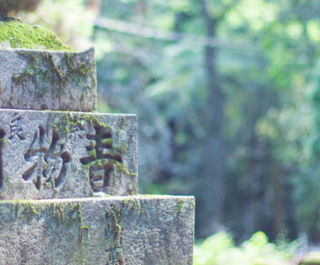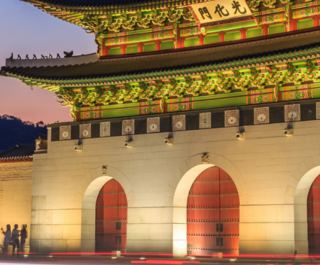
Flight Centre Travel Expert Sheridan Murphy shares a personal story about her recent trip to Bali, and her foray into the Indonesian island’s spiritual heart...
After a whirlwind week’s holiday in Bali, I was ready for one last adventure. I stood in the Bali Garden Beach Resort lobby and took my final look around– the dark wooden furnishings, the statues guarding the property, the tropical gardens that flourish from the driveway throughout the resort, and, of course, the staff who are never without a smile – before I made the most of my final hours in Bali.
Classic Bali experiences
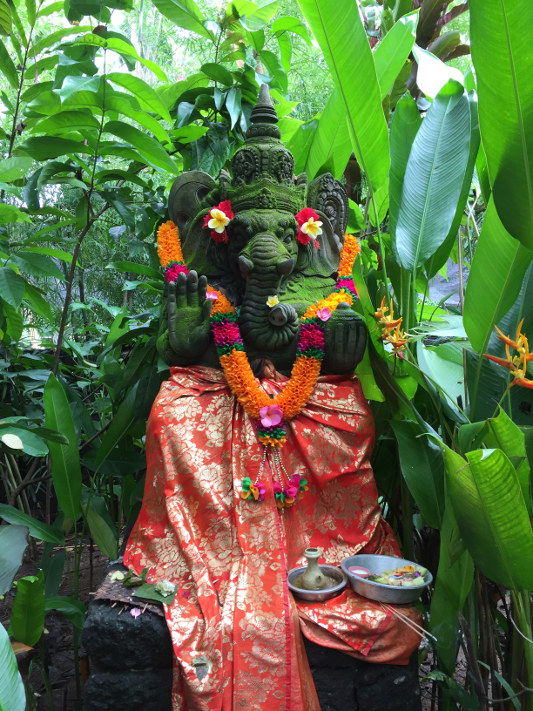 Statues of worship are decorated daily with ornaments and offerings.
Statues of worship are decorated daily with ornaments and offerings. My stay had been filled with Bali must-dos: bartering with the market holders, sinking a few Bintangs on the beach, indulging in a few spa treatments and shamelessly getting braids. Although I had only a few hours to spare, I couldn’t leave the island without experiencing a traditional Balinese healing, similar to Elizabeth Gilbert’s interaction with Ketut in Eat, Pray, Love.
Finding a healer
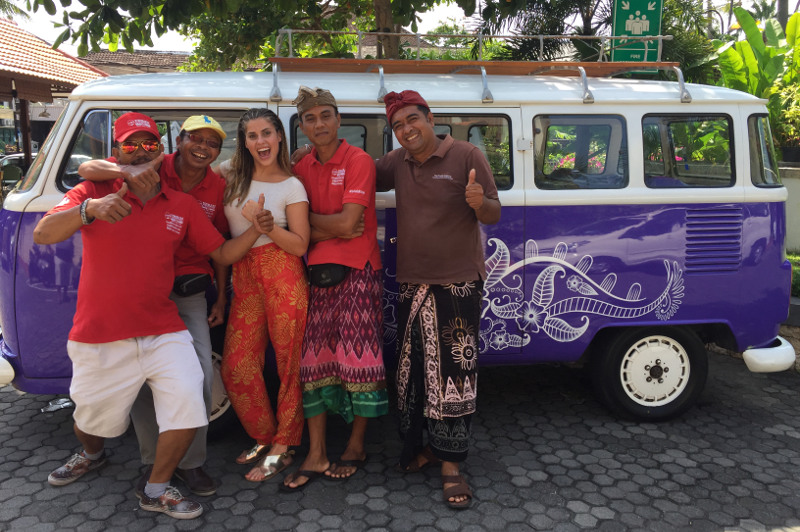 My guide Mangde and driver Ketut, along with two of their colleagues, join me for a photo in front of one of the Kombis from the fleet.
My guide Mangde and driver Ketut, along with two of their colleagues, join me for a photo in front of one of the Kombis from the fleet. After getting in touch with Urban Adventures, I followed their recommendation and arranged to meet with Ibu Iluh. Apparently healing ceremonies are typically led by a male mangku or priest, so being able to make an appointment with a female mangku was very rare. I instantly felt grateful knowing that Ibu Iluh agreed to see me on such short notice.
As I was reflecting on all the incredible Indonesian experiences I’d had so far, a bright-yellow 1980 VW Kombi pulled into the driveway. Immediately I was greeted by Mangde, my guide, dressed impeccably in a traditional sarong – and Ketut, who opened the double doors to the Kombi. The classic van was fully restored inside, complete with handstitched upholstery, minibar and modern fittings. It was a hipster ride from Kuta to the home of Ibu Iluh, just a few suburbs away in Seminyak.
An introduction to tradition
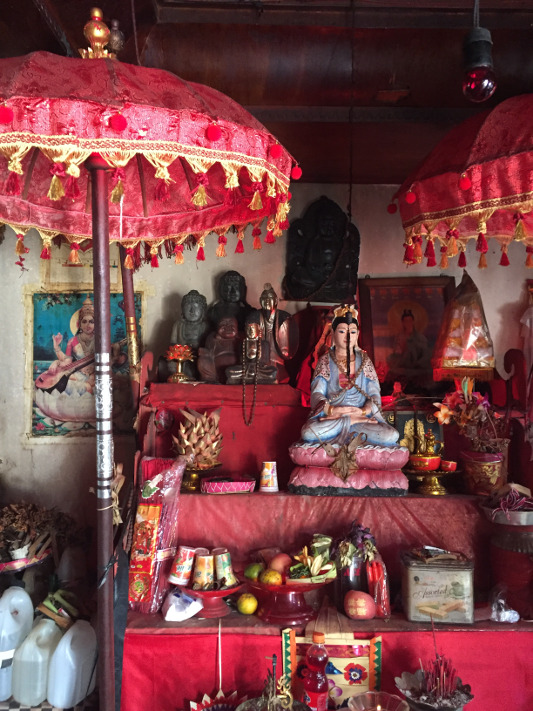 Inside the home of Ibu Iluh, where the healing ceremony was conducted.
Inside the home of Ibu Iluh, where the healing ceremony was conducted. On arrival, I was led into the courtyard and waited while the mangku prepared for the ceremony inside. I watched the smoke from the incense dance above an offering to the gods that rested at the foot of a cement pillar. Finally, Mangde helped me wrap a sarong around my waist and over the top of my already modest choice of outfit before I was silently greeted by Ibu Iluh.
The mangku, Balinese priest
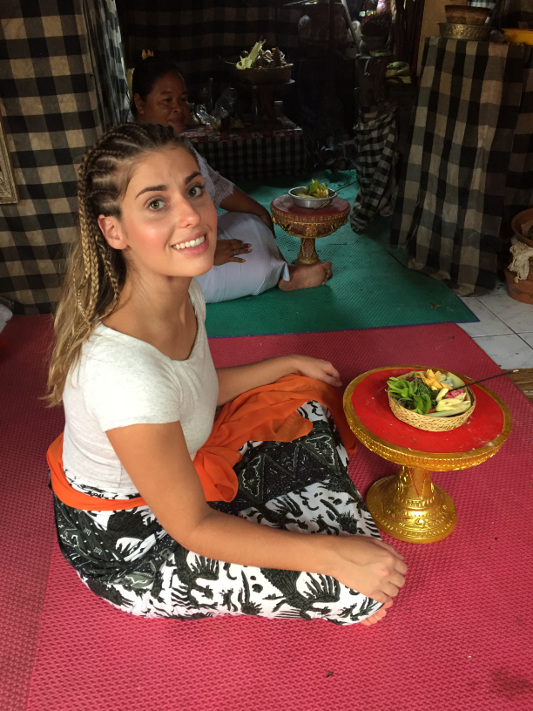 Sitting with Ibu Iluh prior to the healing ceremony.
Sitting with Ibu Iluh prior to the healing ceremony. Ibu Iluh was dressed head to toe in a long-sleeve blouse and a skirt that covered even her ankles, both crisp white in colour. She lead me into a small room dedicated to prayer and religious ceremonies, where two small offerings lay side by side on the floor. As she knelt down and sat comfortably cross-legged, I mimicked her movements. In front of me, a variety of colourful flower petals lay neatly in a bowl made from a leaf, as my own offering to the gods.
An entire wall of the room was covered with statues of the gods and towards them, an ascending platform covered with fruit, water, alcohol, incense – even a few cigarettes – as the largest offering in the home. The mangku spoke softly in broken English. “Close your eyes, take deep breaths,” she said and demonstrated a long inhale and drawn-out exhale. I copied.
Feeling the healing
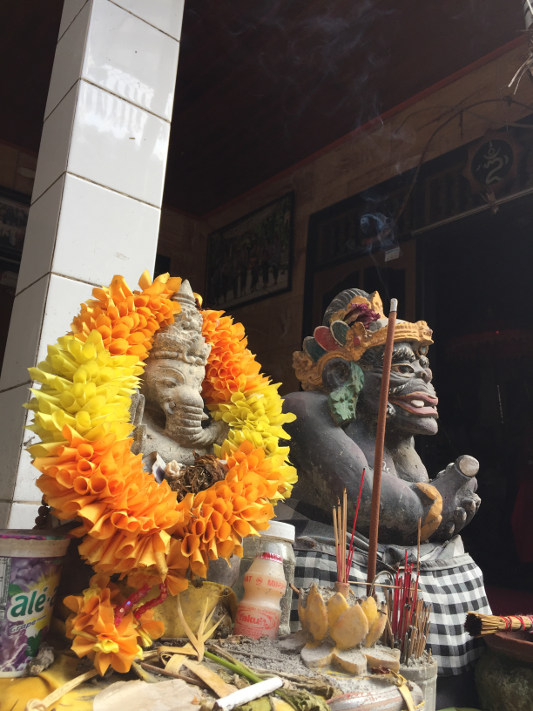 The quirky offering outside the home of the mangku, Ibu Iluh.
The quirky offering outside the home of the mangku, Ibu Iluh. We sat together and completed multiple rounds of deep breathing. Ibu Iluh began softly chanting, leaving me to only guess what she could be asking of those on the other side. Later that afternoon, she explained that the mangku first presents the offering to the gods then, secondly, asks them to help open the mind of those involved in the ceremony so that they may communicate freely.
As I sunk deeper into meditation, I felt Ibu Iluh place her hands on my shoulders, and abruptly swipe her hands off while her chant grew louder. It was as if her hands had a magical magnetic pull, ridding my body of any impurities. The process continued, each time the swipe of her hand more intense. I knew the meditation was coming to an end when I felt the mangku sprinkle flower petals above me and press rice into my third eye.
A sense of calm
It was a challenge to quieten my mind throughout the healing ceremony, as the process was completely foreign to me. However, after sitting through the entire ceremony, I felt relaxed and at peace; a similar feeling I have felt after a yoga class, with an even greater sense of expansion.
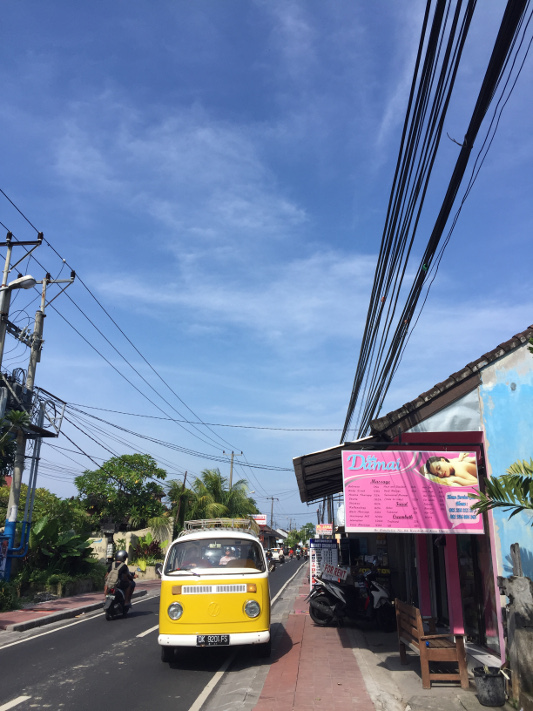 Ketut patiently waiting for me in the refurbished VW Kombi, outside the mangku’s home.
Ketut patiently waiting for me in the refurbished VW Kombi, outside the mangku’s home. Before I left her home, I sat with Ibu Iluh, who tied a tri-colour band made from black, white and red cotton thread on my wrist. On the way back to the resort, my guide, Mangde, caught me admiring the thread in the back of the Kombi. “It symbolises the Creator, the Preserver and the Destroyer of the Hindu religion,” he said. “It is worn for protection.” Flying home, I felt just that.
Feature image: Getty Images
All other images: Sheridan Murphy
For the hottest deals in travel visit your local Flight Centre store, call 131 600 or book now on the Flight Centre App. Check out our Bali Travel Guide for more inspiration


